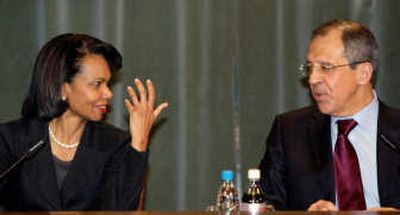Russian, U.S. relations warm over missile defense

MOSCOW – U.S. Secretary of State Condoleezza Rice and Defense Secretary Robert Gates wrapped up talks with Russian leaders Tuesday without any Kremlin commitment to drop opposition to U.S. plans for a missile-defense system in Eastern Europe.
But unlike their last visit here, there were no lectures from the Russian side and no threats, a sign that relations between Washington and Moscow are warming after a long, deep chill.
A tone of measured amicability pervaded over Rice and Gates’ two-day visit to Moscow that included talks with Russian President Vladimir Putin, President-elect Dmitry Medvedev, Foreign Minister Sergei Lavrov and Defense Minister Anatoly Serdyukov.
The centerpiece of the meetings was missile defense, as it was during the two Americans’ last visit to the Russian capital in October, when they met with Putin and later with Lavrov and Serdyukov.
That meeting was overshadowed by a tense encounter with Putin, in which the Russian leader lectured and berated Rice and Gates for moving ahead with plans for missile defense on Russia’s doorstep without taking into account Moscow’s view.
Putin’s tone last fall contrasted sharply with his demeanor Monday, when he warmly received Rice and Gates and called a letter from President Bush laying out a framework for future U.S.-Russian relations a “serious document.” Reaching an accord on elements of the framework would allow both sides to say “that our dialogue is developing in a very productive manner,” Putin told Rice and Gates.
At a news conference after daylong talks Tuesday with the Americans, Lavrov appeared equally cordial. “What happened in October happened in October. It’s March and it’s an optimistic month.”
The change of Russian demeanor was evident in the Kremlin’s posture toward U.S. plans to deploy a ballistic-missile defense system based in the Czech Republic and Poland that would shield Europe and American troops based there from a potential attack from Iran.
The Kremlin has maintained that there is no evidence Iran would have long-range missile ability any time soon. And they worry that future modifications to the shield could pose a strategic threat to Russian national security.
While Lavrov made it clear Russia continues to oppose the missile-defense system, he said Russia is willing to scrutinize measures Rice and Gates proposed that are meant to allay the Kremlin’s concerns about the shield.
At the news conference, neither side would discuss what those measures are. In the past, U.S. officials have proposed holding off on activating the shield until Washington has proof that Iran has missiles capable of striking European territory.
Gates has said the U.S. also would allow Russia monitoring access to the defense shield’s interceptor missiles in Poland and radar system in the Czech Republic as a means of ensuring that the system isn’t directed at Russia.
Both sides agreed that the Rice and Gates delegation would put their proposals in writing by Tuesday evening and submit them to Russian experts for review.
“Since the U.S. is going to carry this out,” Lavrov said, “those proposals that we are expecting to receive on paper today seemed to us, as I said, important and useful for the minimization of our concerns.”